Upload your data to ORDO this Open Access Week (19-26 October) to be in with a chance to win a £100 Amazon voucher! Contact us for more information.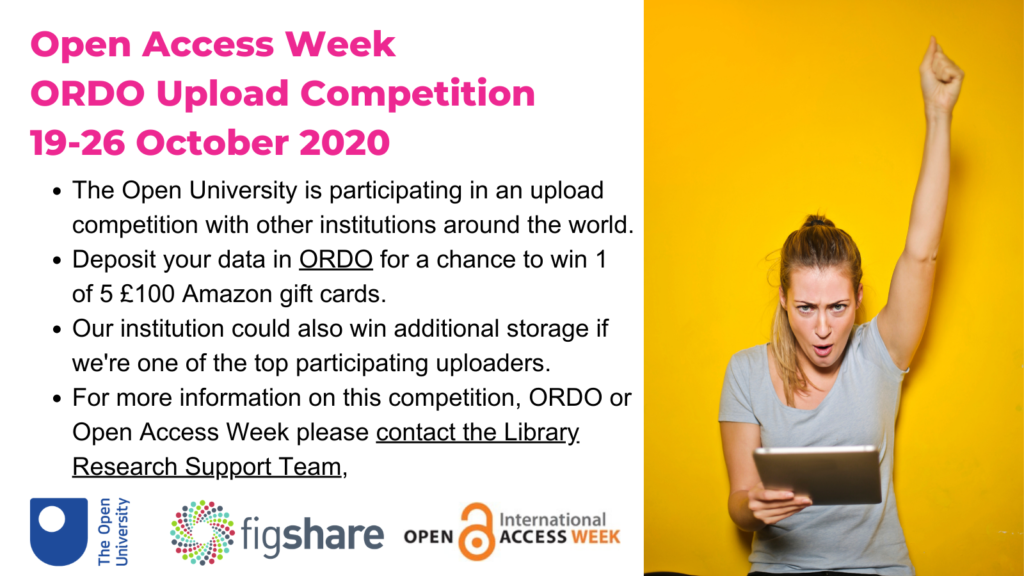

Upload your data to ORDO this Open Access Week (19-26 October) to be in with a chance to win a £100 Amazon voucher! Contact us for more information.
As part of Open Access Week 2020 we are hosting a livestream of Paywall: The Business of Scholarship documentary which will be followed by time for discussion. The focal points of the documentary include:
Everyone is invited! If you fancy joining us on Friday 23rd October 10:30am-12pm for the screening, please register here!
Building a strong online researcher presence can be quite a daunting task so here are some tips to help you take on the challenge.
Firstly it is important to know why it’s important to develop your presence online and there are a few reasons to highlight:
Now let’s move onto tips to build up your presence:
Questions? Contact us here or leave a comment to start a discussion!
The UK Data Service is running the following event which may be of interest to some readers of this blog.
COVID-19 Data Dive: Exploring the social and economic impacts of the pandemic
22 – 23 October 2020
Online
The longer term social and economic impacts of COVID-19 are yet to be evidenced but there are already signs of shorter term challenges.
The UK Data Service has organised a free, two-day Data Dive as part of the rapid research response to the pandemic. By bringing together major social, economic and population studies in a single place, we provide an opportunity for researchers, policy and charity experts to collaborate and draw out critical questions about the impacts of the pandemic that will need to be addressed in the future.
The event is jointly organised by the UK Data Service, Understanding Society, UCL Centre for Longitudinal Studies (CLS) and the Welfare at a (Social) Distance research project; all UK Research Innovation programmes.
Participants will work in small teams alongside different experts from other organisations, including data producers, policymakers and charities, and will be able to link with other related datasets, to find new areas of research interest.
The challenge: What do we know and what do we still need to ask about COVID-19 and its social and economic impacts on society?
How can we utilise the data resources to learn and discover themes and ideas for next steps.
During the Data Dive, participants will:
We’d like to hear from you: Please submit details via the expression of interest form.
Successful applicants will be sent a registration link to book. Once registered, you will receive an email with joining instructions and the Zoom link to attend the event.
More information
Talk to the experts: During the day there will be a chance to talk to the experts from each of these major studies.
Target audience: This Data Dive is aimed at researchers, data analysts, policymakers, charities, coders and Service users with special interest in the benefit system, social care, housing policy and the charity sector. Those not working directly with data are welcome; data specialists from the UK Data Service, Understanding Society, UCL Centre for Longitudinal Studies and University of Kent will be on hand to discuss the data.
Experience/knowledge required: Participants should have basic experience of quantitative analysis using a statistics package OR have an invested knowledge base of the subject matter. If you are not yet UK Data Service users, participants will need to register with the UK Data Service before the start of the event to access the data. This is in addition to registering for the event.
Online location: The Data Dive will take place over Zoom.
For any enquiries please email comms@ukdataservice.ac.uk.
Follow the event on Twitter: #UKDSCovidDataDive
Access to library buildings around the UK continues to be restricted by government social distancing guidelines to prevent the spread of Covid-19. The SCONUL Access scheme, which ordinarily allows OU students and staff to apply to visit other university libraries near them, has been suspended until further notice. The OU Library building remains closed for all visitors.
The online OU Library is available to provide resources to support you with thousands of ebooks, online scholarly journals and newspapers, archival sources full of treasures to explore as well as image databases and more. Whether you are a lark or a night owl, the Library Help Desk offers live online help through our 24 hour chat service. Need to find an article? Question about what keywords to use in your search? Discovered something Google can’t answer? Let a librarian help! Any time day or night, the OU Library is here for you.
For more information or assistance contact the OU Library Helpdesk.
Did you know that as well as linking ORO to ORCiD you can also link your ORCiD with your ORDO profile? This will add all your datasets in ORDO (and anywhere else that uses a DataCite DOI) to ORCiD.
This is really quick and easy to do, simply follow these steps:
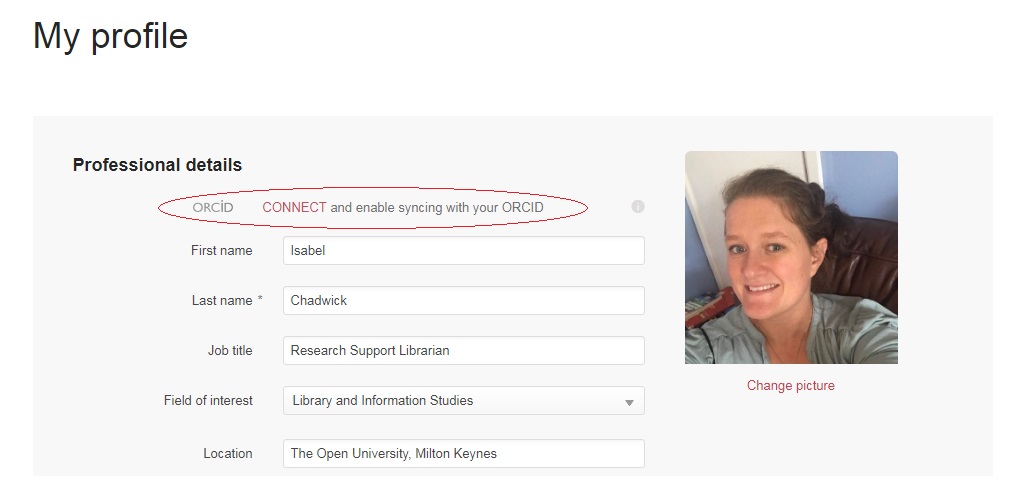
You now need to authorise DataCite on your ORCiD account:
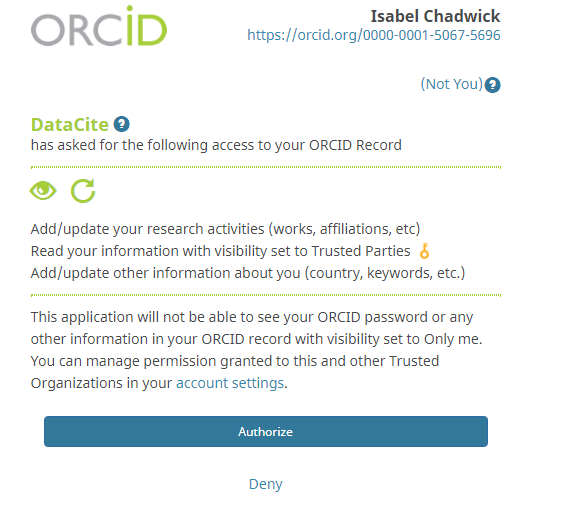
To check the authorisation has worked successfully head back to ORCiD and to your Account Settings tab. DataCite should now be listed as a Trusted organisation.
If you’re having problems setting this up or would like more information about using ORDO or ORCiD, please get in touch.
 Here in the Library Research Support team we’ve been busy planning our training sessions for the next few months and we’re sure there’s going to be something that tickles your fancy!
Here in the Library Research Support team we’ve been busy planning our training sessions for the next few months and we’re sure there’s going to be something that tickles your fancy!
We’ve got some new sessions planned, including an inroduction to copyright for Postgraduate Research Students and some more in depth sessions on Research Data Management, including the intriguingly named Declutter your Data!
All of our training for the remainder of 2020 will be delivered online through our Adobe Connect room so you can access all these sessions wherever you are in the world! Details of how to access the room are included on the My Learning Centre pages linked to below.
Library Research Support training September-December 2020
Publications in ORO can be tagged with a Research Group – this enables the publications of any research group to be searched for, grouped, and listed on a single webpage in ORO.
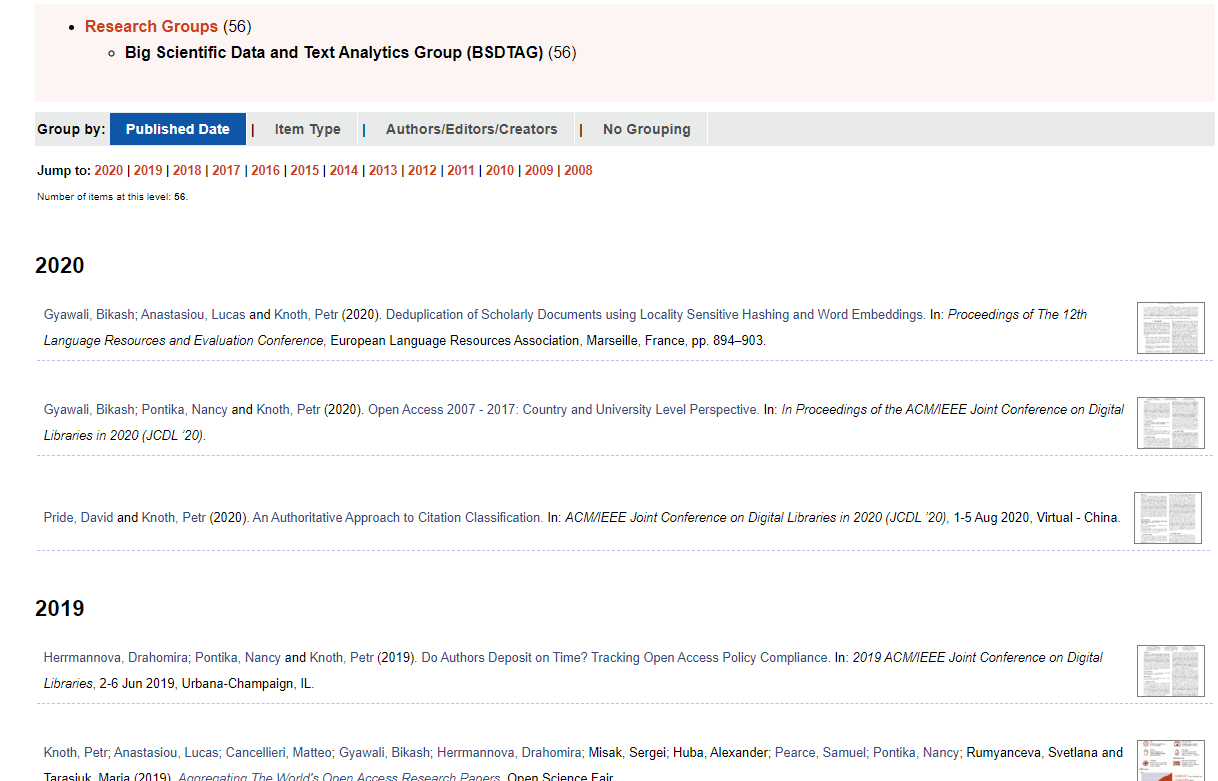
Once a Research Group has been added to ORO it will appear in a drop down list in the deposit workflow in ORO.
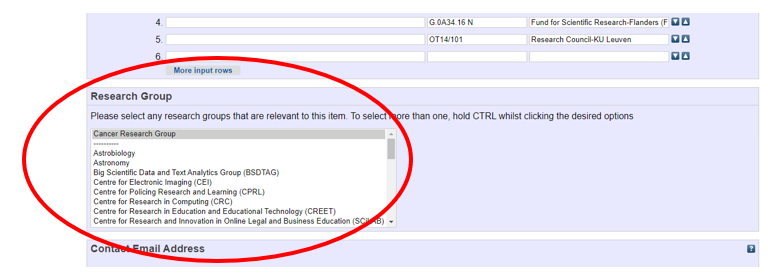
If you deposit a publication and know it should be associated with Research Group select that Research Group when creating the record in ORO.
If a publication is already ‘live’ in ORO a Research Group can be added by the depositor or an OU co-author by clicking the Submit Changes (Authors/Depositor only) link on the top right of a publication record. This will allow you to edit the live record and a Research Group can be added.
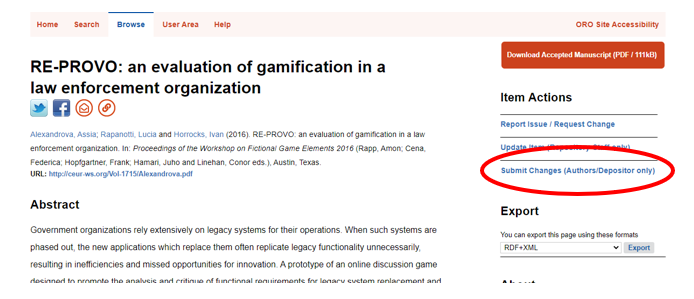
Changes to multiple records (e.g. when a Research Group is first created in ORO or the publications of an author) can be arranged by contacting library-research-support@open.ac.uk
No, the way Research Groups are designed in ORO has changed so this cannot occur. Previously Research Groups were associated with an author so all publications by an author were automatically tagged with the associated Research Group. This did not work (especially for inter-disciplinary Research Groups) as the publications record of a single author frequently did not sit neatly within the subject domain of a single Research Group.
The functionality was re-designed so Research Groups must be actively selected for each publication. Whilst this means Research Groups cannot be added automatically to any publication, it does allow any Research Group to be added to any publication regardless of author.
Yes, a publication can be associated to more than one Research Group. To do this select the required Research Groups by holding the Ctrl button whilst clicking on multiple Research Groups (PC User).
Publications tagged with a Research Group in ORO can dynamically feed another web page e.g. a page on the Research Group website.
One option is to use the “Embed as feed” link from the right-hand menu and follow the instructions.

Note: These use RSS feeds and are therefore restricted to displaying outputs in reverse order of addition to ORO.
It doesn’t – Research Groups are self-defining. A Research Group can be created in ORO on request, no threshold of what a Research Group constitutes needs to be met before it can be created in ORO. Similarly, ORO does not attempt to hold a definitive list of Research Groups at the OU.
If you haven’t heard of BrowZine yet you need to check this out!
BrowZine is a website designed to allow you to browse scholarly journals from different publishers all in one place! What more could you want?
This is the home page which offers you the option to either search in the search bar or choose a subject from the list.
Once you’ve selected the journals by category or subject, the titles are displayed by journal rank or A-Z. Then it is simply one click to search the entire journal for relevant articles which you can read directly through the database. In the image below you will notice the journals are listed in alphabetical order and in the top left-hand corner you can go back to change the subject you are searching under. It really is that simple!
Another amazing feature of BrowZine is that it is extremely tablet and mobile device friendly so it is perfect for browsing on the go. This means you can read complete scholarly journals in a format that is specifically optimised for mobile or tablet devices.
To access BrowZine follow this link. This will ensure you are accessing the database via our OU proxy URL. Alternatively, you can head to our library website and click ‘database collections’ underneath the search bar. You will find BrowZine listed under ‘B’ and from there the link will take you to the database.
To help writers stuck in a rut under lock-down, Prolifiko are currently offering free places on their 7 day writing sprint club – a structured programme that helps you supercharge a piece of writing over a week.
Whether you’re stuck in the middle of a writing project or just starting out, their 7-Day Writing Sprint will give you structure, focus and accountability to need to finish. Sign up quickly as places are likely to go fast!
Who are Prolifiko?
Prolifiko are a husband and wife team of professional writing coaches who together have over 30 years’ experience of supporting writers to, well, write. They coach writers from diverse backgrounds, from poets to academics, and offer writing courses, bootcamps and webinars designed to re-ignite a passion for writing and boost productivity.